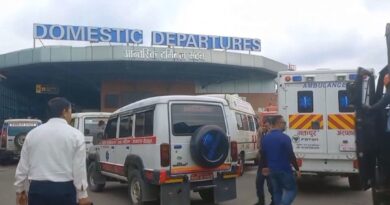Panic in Britain with scramble to stop IS fighters returning from Syria | World | News
British forces have been tasked with stopping dozens of Islamic State fighters held in Syrian prison camps from escaping and joining refugees heading to the UK.
At least 60 former Britons who joined the terror group, including “Jihadi Jack” and Shamima Begum, are among 45,000 men, women and children held at the al-Hol and Roj camps in north-east Syria.
Of these, around 10,000 are thought to be battle-hardened ghters.
Intelligence chiefs have warned they pose a significant threat as it is feared they will be released by the new regime after dictator Bashar al-Assad was deposed last weekend.
To stop IS extremists heading for Britain to potentially carry out terror attacks, the RAF will deploy RC-135 surveillance air- craft and “spy in the sky” Reaper drones.
Their advanced image technology and voice recognition systems can identify and track high value targets from 50,000ft.
Among former British citizens detained at the camps are Jack Letts, 29, from Oxford, who was nicknamed “Jihadi Jack” after travelling to Syria in 2014, and Begum, 25.
She was a 15-year-old schoolgirl when she travelled from Bethnal Green, east London, to become an IS bride in 2015.
Beleaguered Kurdish troops of the Syrian Democratic Forces guarding these detainees have warned that, unless they get more support, the extremists will break out and rise again. SDF commander Siamand Ali said: “The IS prisons and camps have become a way in which IS can re-establish themselves.
“In the camps you’ve got a whole generation trained in IS ideology, methods and way of life.”
He added: “It’s a ticking time bomb which can explode any time.”
His fears were echoed by former head of MI6 Sir Alex Younger, who warned: “There is a key operational issue for the UK which will drive a lot of our policy.
“The SDF, the Kurdish group, hold many, many IS prisoners and their families taken after the end of the caliphate.”
The situation is made more fragile by Turkey’s daily attacks on SDS Kurdish forces, in a bid to prevent Kurdish stability.
For the past decade the US has funded security at the camps alongside a small joint force of US and British troops.
They were primarily deployed to counter any resurgence of IS in the area and to monitor high-value targets among inmates.
There are fears that President Donald Trump will order the withdrawal of all US troops from Syria and cut funding for security at the camps, enabling thousands of extremists to walk free.
The UK has more than 200 troops deployed in Syria and northern Iraq as part of Operation Shader, ostensibly there to train members of the Kurdish Peshmerga.
But their mission is due to end next year.
Senior military sources last night confirmed moves to deploy RAF MQ-9AS Reaper drones from the Ali Al Salem air base in Kuwait on fresh round-the-clock missions to monitor the camps.
The Reapers will stream live footage to a ground operations command. They will be joined by an RAF RC-135W Rivet Joint communications aircraft, which will use its sensors to “soak up” chatter from mobile phones, radar and other systems.
Washington and London are urging Turkey not to destabilise the region but there is concern that Vladimir Putin, who had to withdraw his forces from a crucial hub, will encourage President Erdogan to increase attacks on the Kurds and cause problems for Western governments.
Days after rebel forces ousted Assad, the US mounted precision air strikes against more than 80 known IS camps and operatives in central Syria. They would, sources say, target any IS escapee who heads for these camps in the same way.
Former defence minister Tobias Ellwood said: “It was a failure of the international community not to have a resolute strategy to deal with the vast numbers of extremists that ended up in these camps, and who we are not de-radicalising.
“When you pack thousands of hardliners in with the general population and you do nothing to either process them or deradicalise them, all you do is kick the can down the road. We’re left in this situation now where the Kurds potentially couldn’t cope.
“Revenge is probably going to be high on their list of priorities. Once in Europe, we won’t be able to reach them.”
Diplomats from Turkey, Europe, the US as well as the Arab nations have convened in Jordan to hold a summit on Syria.





